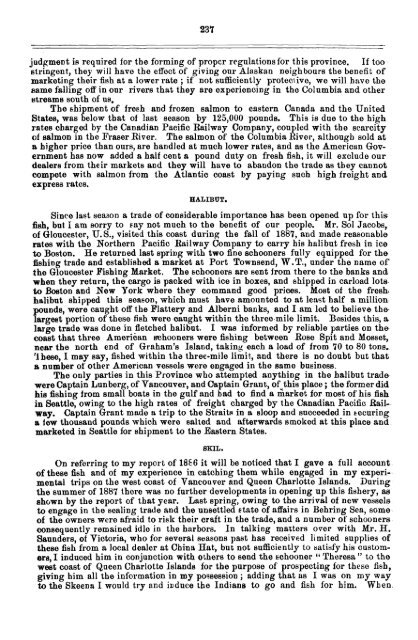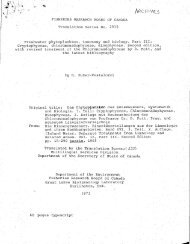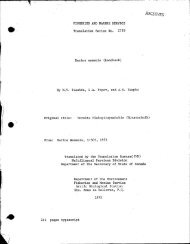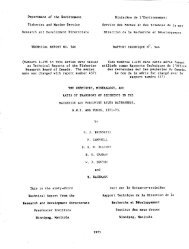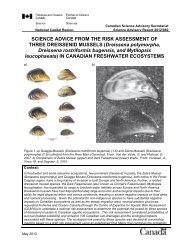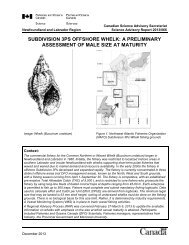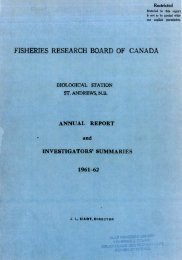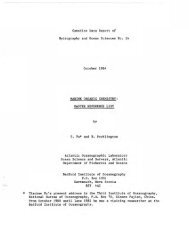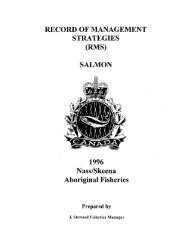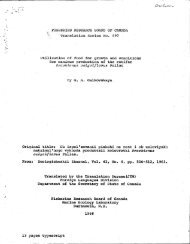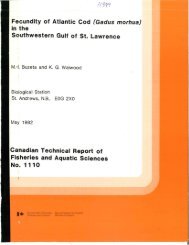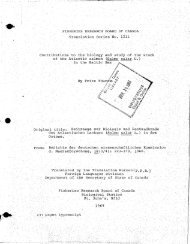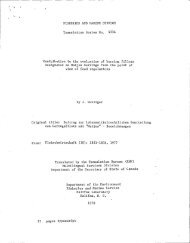You also want an ePaper? Increase the reach of your titles
YUMPU automatically turns print PDFs into web optimized ePapers that Google loves.
237<br />
judgment is required for the forming of proper regulations for this province. If too<br />
stringent, they will have the effect of giving our Alaskan neighbours the benefit of<br />
marketing their fish at a lower rate; if not sufficiently proteciive, we will have the<br />
same falling off in our rivers that they are experiencing in the Columbia and other<br />
streams south of us,<br />
The shipment of fresh and frozen salmon to eastern Canada and the United<br />
States, was below that of last season by 125,000 pounds. This is due to the high<br />
rates charged by the Canadian Pacific Railway Company, coupled with the scarcity<br />
of salmon in the Fraser River. The salmon of the Columbia River, although sold at<br />
a higher price than ours, are handled at much lower rates, and as the American Government<br />
has now added a half cent a pound duty on fresh fish, it will exclude our<br />
dealers from their markets and they will have to abandon the trade as they cannot<br />
compete with salmon from the Atlantic coast by paying such high freight and<br />
express rates.<br />
HALIBUT.<br />
Since last season a trade of considerable importance has been opened up for this<br />
fish, but I am sorry to ay not much to the benefit of our people. Mr. Sol Jacobs,<br />
of Gloucester, U.S., visited this coast during the fall of 1887, and made reasonable<br />
rates with the Northern Pacific Railway Company to carry his halibut fresh in ice<br />
to Boston. He returned last spring with two fine schooners fully equipped for the<br />
fishing trade and established a market at Port Townsend, W.T., under the name of<br />
the Gloucester Fishing Market, The schooners are sent from there to the banks and<br />
when they return, the cargo is packed with ice in boxes, and shipped in carload lots<br />
to Boston and New York where they command good prices. Most of the fresh<br />
halibut shipped this season, which must have amounted to at least half a million<br />
pounds, were caught off the Flattery and Alberni banks, and I am led to believe the<br />
largest portion of these fish were caught within the threernile limit. Besides this, a<br />
large trade was done in fietched halibut. I was informed by reliable parties on the<br />
coast that three American snhooners were fishIng between Rose Spit and Mosset,<br />
near the north end of Graham's Island, taking each a load of from 70 to 80 tons.<br />
'1 hose, I may say, fished within tha three-mile limit, and there is no doubt but that<br />
a number of other American vessels were engaged in the same business.<br />
The only parties in this Province who attempted anything in the halibut trade<br />
were Captain Lunberg, of Vancouver, and Captain Grant, of this place; the former did<br />
his fishing from small boats in the gulf and bad to find a market for most of his fish<br />
in Seattle, owing to the high rates of freight charged by the Canadian Pacific Rail..<br />
way. Captain Grant made a trip to the Straits in a sloop and succeeded in ecuring<br />
a few thousand pounds which were salted and afterwards smoked at this place and<br />
marketed in Seattle for shipment to the Eastern. States.<br />
SKIL.<br />
On referring to my report of 18E6 it will be noticed that I gave a full account<br />
of these fish and of my experience in catching them while engaged in my experimental<br />
trips on the west coast of Vancouver and Queen Charlotte Islands. During<br />
the summer of 1887 there was no further developments in opening up this fishery, as<br />
shown by the report of that year. Last spring, owing to the arrival of new vessels<br />
to engage in the sealing trade and the unsettled state of affairs in Behring Sea, some<br />
of the owners were afraid to risk their craft in the trade, and a number of schooners<br />
consequently remained idle in the harbors. In talking matters over with Mr. H.<br />
Saunders, of Victoria, who for several seasons past has received limited supplies of<br />
these fish from a local dealer at China Hat, but not sufficiently to satisfy his customers,<br />
I induced him in conjunction with others to send the schooner "Theresa" to the<br />
west coast of Queen Charlotte Islands for the purpose of prospecting for these fish,<br />
giving him all the information in my possession; adding that as I was on my way<br />
to the Skeena I would try and induce the Indians to go and fish for him. When


